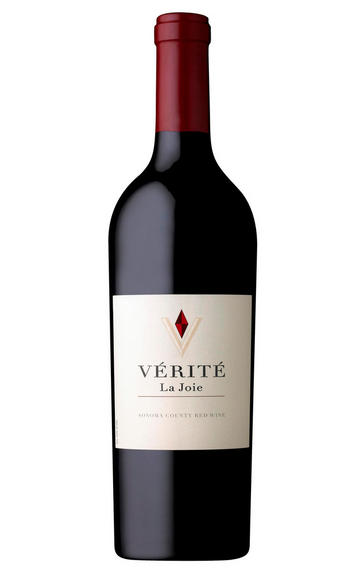
2006 Vérité, La Joie, Sonoma County, California, USA
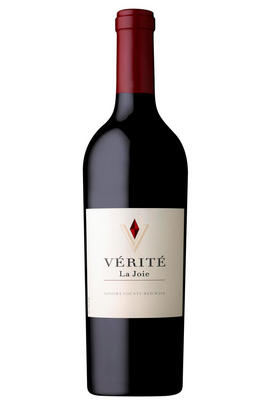
Critics reviews
This blend of 64% Cabernet Sauvignon, 13% Merlot, 12% Cabernet Franc and the rest Petit Verdot and Malbec is a broodingly burly, masculine wine with lots of intensity and richness, but not the finesse, charm or overall complexity of top vintages of La Joie. More undeveloped and monolithic than usual, it may simply need additional time in the bottle.
Robert M. Parker, Jr., Wine Advocate (May 2011)
About this WINE
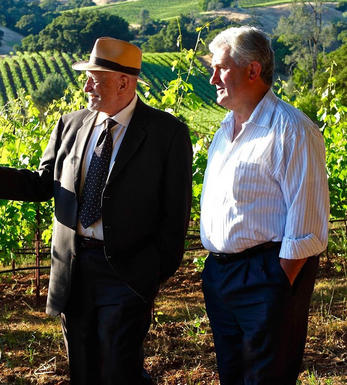
Vérité Winery
The Vérité estate is a vision created by the late Jess Jackson, a man who in Robert Parker’s eyes “was one of the most extraordinary men in the wine world I have ever met.” These wines always rate very highly (indeed, since 1998 seven have been awarded 100 Parker points) and the 2010 vintage is gaining great praise from the press and critics alike as a potential emergence of a new iconic wine from the United States.
The wines of Vérité, French for “truth,” are the result of a combination of old world experience and new world fruit. The wine is a distinct blend of varietals harvested from small vineyard blocks, each cuvée culminating in a bespoke union of grape varieties, climate, soil expression and winemaking technique. Vigneron Pierre Seillan refers to this methodology as droit du sol: “right of the soil.”
“The wines are elegant and complex, possessing superb concentration of flavor and color. These are wines meant to age over the next thirty years and will develop greater depth and character in your cellar.” Pierre Seillan, winemaker
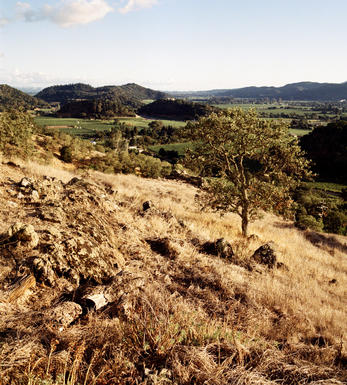
Sonoma County
North Coast's Sonoma County is California's largest AVA with 19,800 ha (2005) of vines. It has forever been the home of the meek and mild small grower as compared to the grandeur and might of neighbour Napa; more picturesque too, as much of the sandy, gravely loam land belonged to true orchards and fruit farms until the 1970s.
Sonoma Valley covers a small part of Sonoma County but its wines often outshine its illustrious neighbours in Napa County. Zinfandel, Pinot Noir, Chardonnay, and Cabernet Sauvignon are cultivated here with much success. Sonoma Valley has long enjoyed a special place in the history of California wine. The first vineyards in the valley were planted by Franciscan monks in 1823. In 1857 Agoston Haraszthy, one of the founding fathers of California's commercial winemaking, opened here the highly successful Buena Vista Winery.
Closer to the coast are the region's top producing AVAs for Pinot Noir and Chardonnay: Russian River, Sonoma Coast and Green Valley, while the slightly warmer Dry Creek and Alexander Valleys have earned a reputation as a hotspot for Cabernet, and increasingly, Zinfandel and Merlot.
Recommended producers
Ridge, Teira, Williams & Selyem, Rochioli are definitely worth investigating.
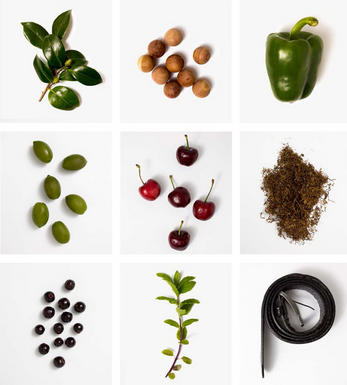
Cabernet Sauvignon Blend
Cabernet Sauvignon lends itself particularly well in blends with Merlot. This is actually the archetypal Bordeaux blend, though in different proportions in the sub-regions and sometimes topped up with Cabernet Franc, Malbec, and Petit Verdot.
In the Médoc and Graves the percentage of Cabernet Sauvignon in the blend can range from 95% (Mouton-Rothschild) to as low as 40%. It is particularly suited to the dry, warm, free- draining, gravel-rich soils and is responsible for the redolent cassis characteristics as well as the depth of colour, tannic structure and pronounced acidity of Médoc wines. However 100% Cabernet Sauvignon wines can be slightly hollow-tasting in the middle palate and Merlot with its generous, fleshy fruit flavours acts as a perfect foil by filling in this cavity.
In St-Emilion and Pomerol, the blends are Merlot dominated as Cabernet Sauvignon can struggle to ripen there - when it is included, it adds structure and body to the wine. Sassicaia is the most famous Bordeaux blend in Italy and has spawned many imitations, whereby the blend is now firmly established in the New World and particularly in California and Australia.


Buying options
Add to wishlist
Description
This blend of 64% Cabernet Sauvignon, 13% Merlot, 12% Cabernet Franc and the rest Petit Verdot and Malbec is a broodingly burly, masculine wine with lots of intensity and richness, but not the finesse, charm or overall complexity of top vintages of La Joie. More undeveloped and monolithic than usual, it may simply need additional time in the bottle.
Robert M. Parker, Jr., Wine Advocate (May 2011)
wine at a glance
Delivery and quality guarantee